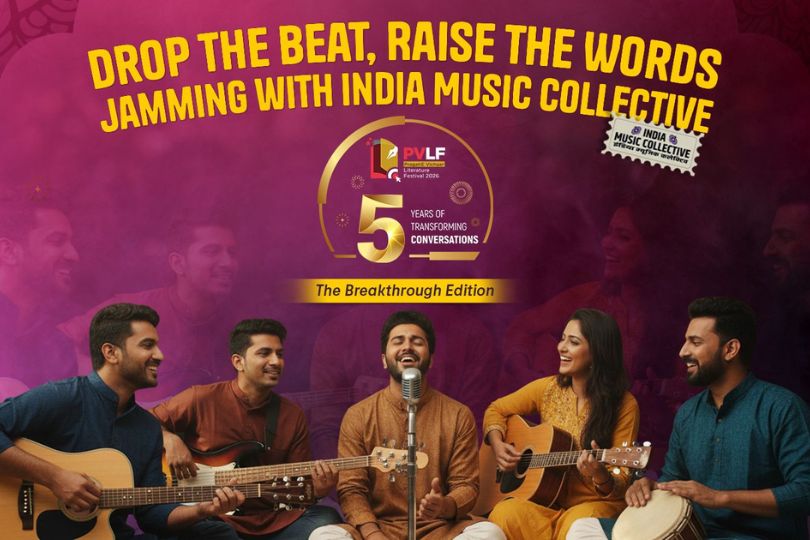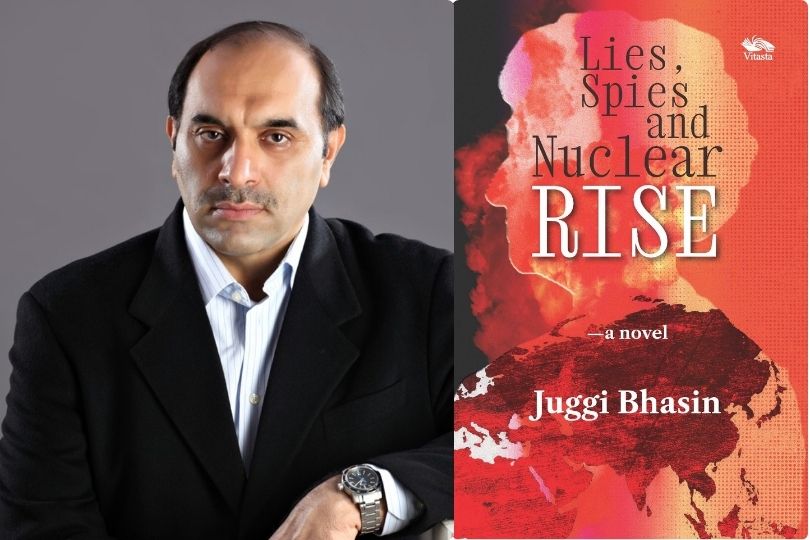The Frontlist Show: Beyond the Written Word
Episode 2 | Sanskrit in Modern India
on Aug 10, 2022In this episode, Dr Prasanna discussed his journey in the realm of Sanskrit Literature and mentioned how our society needs to inculcate the passion for Sanskrit among younger generations.
.png)
Frontlist: Welcome to "The Frontlist Show": Beyond the written word.
This is Jyotsna Thakran, the host for today's session.
The Frontlist Show: Beyond the written word.
It's a podcast series organized by Frontlist Media. Through the podcast series, you will have judgment-free chats and discussions with the authors, publishers, and other people across the publishing industry.
Here we are back with another podcast episode and today's podcast episode is very different and related to our Indian roots. Today's topic is "Sanskrit in Modern India."
Sanskrit literature hasn't lost its charm, but we must revive the Sanskrit language among us. So that is why we have curated a session today. Precisely for this podcast episode, we have Dr Prasanna Chandra Gautam. It's an absolute delight to have you, sir, today. He is an experienced science author and teacher and well placed to interpret and present ancient Sanskrit texts. He has translated Rigveda from Sanskrit to English, Nepali, and Hindi and has studied ancient Sanskrit Literature since 2005.
I believe he is the perfect person for this particular episode.
Prasanna: I'd like to begin by Upanishad Mantra, we said, Sahanavavatu | Sahanaubhunaktu | Sahaviryamkaravavahai. What this means is, let us be nourished together and do great things together. With us, all be happy together. Thank you for giving me this great honor. I would have thought that after years of the primary institutions, the transcript universities, and other academic institutions in India would have been better for you to begin this series. As they say in Sanskrit, I'm only a researcher and an enriched one, but I will try my best and see if I can answer your questions.
Frontlist: Trust us, we are glad to have you today.
"Sanskrit in Modern India."
This is the topic for today. What would you like to say about this topic?
Prasanna: My thoughts are very positive on this matter. Sanskrit is the language of original recursion of Sanskrit history because Deva Vani meant the speech of the civilized people who praised devata. According to Sayana Acharya, the great author, the person praised is God, and that's how you define what they were. Deva Vani was the original SANSKRIT which became a subsequent development of Deva Vani and Indian languages, particularly Indo-European languages or Sanskrit. Then it went further down and became Prakrit. Bengali is very much Sanskrit for Nepali, Hindi, and other languages, as all offshoots of Sanskrit are, so it's imperative.
Frontlist: Today's generation is more of the English language because they think it is a status symbol and thus lose their Indian roots. Sanskrit has been with us since time immemorial. How can we revive interest in the Sanskrit language among younger generations, though they tend to favor westernisation?
Prasanna: Well, any language's usefulness is the content within it. So, let's make things the heritage of the great philosophical concepts in the Sanskrit language and make them freely available and relevant. One can revive Sanskrit or develop interest among younger people willing to learn so much. But, if we limit ourselves to all the mumbo jumbo of some priestly mantra, which means nothing, and even the app not being appropriately pronounced, I don't think you will be able to do that.
Frontlist: The fascination with learning should come from families, and it has to be from the surrounding. We must push ourselves to learn Sanskrit and its cultural roots. Do you think this is our fault that we lack here today?
Prasanna: Now you see what has been happening. We, as parents, have failed to a large extent to have a proper comprehensive education. Formal, comprehensive education gives two things: One - it helps to develop self-confidence, righteousness, good values, and that kind of thing, which allows that person to face any adversities in the world. The next component is teaching them how to earn a living and become a professional. Currently, we're mainly concentrating on how to become a professional, an engineer, a doctor, and a teacher. We are not teaching them as parents how to become good human beings. And that is where the difficulty lies.
Frontlist: I absolutely agree with you. Students had the choice of learning Sanskrit, even when I was in school, so I also chose to take Sanskrit as a subject. Still, students always prefer to offer French, German, and other languages because these languages fascinate them more. Globalization is a key reason that widens the gap between our Indian roots. That is why we are losing our way from the Sanskrit language and opting for different languages. So, what are your thoughts on this?
Prasanna: Yeah, our Indian roots, not the language, but the Indian values, are depicted in the Sanskrit language in ancient times. So, that is where the difference lies. Whereas today, we live in a global world, we have to be able to market ourselves all over the world anyway, whether we are living in India, we can still work anywhere, for any other country, anywhere in the world. So we live in a global situation now. And for that, there are five globally acceptable languages for various interactions. It's not surprising that you chose to learn French rather than Sanskrit. Because Sanskrit didn't give you that kind of motivation, I think the teachers didn't teach you what is in Sanskrit.
Frontlist: Do you think people have career prospects in the Sanskrit language?
Prasanna: Oh, yes, there are. There are lots of universities in the world. In the United States alone, there are about 20 universities where Sanskrit is taught in various aspects of various subjects in Britain, India, Russia, and Holland, all over. Still, you see it as a language or as literature. What you're saying is different from what I hear because language is our thing, a fascination for everybody. Linguists, Indo-European languages, and proto-Dravidian or postulates languages are there. This is a big subject. There are a lot of controversies as well. So, there is much scope for research, further learning, and purpose, but of limited scale.
Frontlist: How did you come across the Sanskrit language? When did you start translating the Rigveda text from Sanskrit to English, and when did you start your journey with Sanskrit literature? Please share your thoughts.
Prasanna: Okay, I was learning Sanskrit with my grandfather in Varanasi when I was a boy. But at that time, there were two primary texts; one called the Astra Adhyaya and the other one called Amar Kosha. So, we had to memorize, I was asked to learn them, And when I asked for their meaning, he said, "Oh, you will get to know the meaning." I just memorized it first. So it became a dull thing that didn't interest me much. But I had to do it. And I had to learn it. So it went on like that. But subsequently, there was a change in my family. And my grandfather said, no, stop studying Sanskrit, and you got to start studying English. And you can learn Sanskrit when you retire when it becomes automatic. So I suppose it just happened that way, but I have kept my interest in Sanskrit, whatever little Sanskrit I learned, you know, whenever there was an opportunity, I read Sanskrit books. So I've kept in touch, but I hadn't given it a serious thought into them. I started properly in 2005.
Frontlist: Why do people misunderstand that Sanskrit is the language of the Hindus? Please share your opinion.
Prasanna: Yes, Sanskrit has never been a very well-spoken language, even in India, because learning was prohibited for women. 50% of the population was not allowed. And in the other two classes, the ratios in the sutras were not allowed. That means neither was allowed, and an additional 25% were not allowed. It was spoken by only a very few elite Brahmin people. Many of them didn't even understand that. The Vedic concept of times, very ancient times, got changed into a religious image. Religion was practically the monopoly of the Brahmin priest. So that's how it became like the language of the Hindus, and that understanding is not wrong. But that's how it has been all along.
Frontlist: When researching this topic, I learned that people think that the Sanskrit language is not enough to gain mass popularity since the prevalence of the other languages. People are moving forward with the English language rather than going backward and opting for Sanskrit literature. How can we debunk this myth and start looking a different way and spread awareness? So, what are your thoughts about this? Do you think the Sanskrit language is not enough to gain mass popularity?
Prasanna: The Sanskrit language can gain popularity if we begin to teach our students, even our parents, the good things in this language. For example, if we started teaching all these aphorisms of Punisher, the one mantra I gave you earlier, every class a different year, opening shots as part of the Sanskrit language and the Vedic mantras, their meaning, something like that. It has to be universal, not related to any one religion. These are human values. But things were frustrating in Sanskrit. So reading Sanskrit is helpful because this is how it goes. I'll give you a few examples here. Lots of you know there is a superior Sufi cult in Islam. Now, Dara Shikoh was the grandson of Akbar, and he translated punishers, from Sanskrit, into Farsi, or the Persian language. That is how the West got to know about Indian philosophy. And there's nothing wrong with it. So this kind of human values, human devotion, and human faith transcend religion, the narrow religion of Columbia. Our former president, a Muslim, was trained in Atharva Veda, and all the Veda, he was a nuclear scientist. So this is how we have to show what's inside the language. We have to offer the value of the language. I am not saying just become very patriotic and say I want Sanskrit; I will have Sanskrit. We have to see what is in Sanskrit like when you are selling something, you say, "Look how good it is," unless you see how good it is, you're going to show the package, and there you are, it's a beautifully packed ticket and nobody will buy it.
Frontlist: So, if we want people to learn Sanskrit literature, we have to tell them to create some interest in it, that they will learn Sanskrit literature and start loving it.
Prasanna: That's right. Sanskrit is beautiful, the language, the literature, the philosophy part. The other things, but all kinds of subjects you can think of, very passionately. When I started reading Sanskrit, I was fascinated by what I was reading, and I had never thought of it before. For example, atoms and molecules were thought of in a philosophy called Nia long ago, long before the concept of atoms was thought of by Western people or given to Greek people. It's all there, but we're not bringing them out. We're bringing out all this mumbo jumbo of puja mantras, which nobody understands.
Frontlist: Even the priests don't know what they are literally chanting sometimes, you can't.
Prasanna: Quite right.
Frontlist: I'm happy that you have learned Sanskrit literature and language, and that's why we are together today to discuss this topic. So we celebrate many special days at the national and international levels to revive the relevance for audiences. For example, Yoga Day, right? We celebrate Yoga Day on international and national levels. So don't you think we should celebrate Sanskrit to revive the Sanskrit literature within us? What's your take on this?
Prasanna: Again, Yoga has become a vast commercial and political tool besides actual usefulness, so this kind of Yoga Day or this day, that day, and if we talk about Women's Day, for example, if we look at women today, there are so many women still being abused, and not given that rightful place in society and all that. We celebrate women's day of the year and are not doing anything more. I think I would be happier to celebrate specific values. These are the values like human rights issues, which we call Western issues; they're not Western issues. That was the Vedic mantra last month. All brothers have not covered each other's property. Let's not be greedy. Let's have the same mind. These are human values of brotherhood. So I think this value would be much more helpful, but I have no objection to celebrating the word Sanskriti. But I cannot be too enthusiastic about it, because will it mean anything? Will it make any difference?
Frontlist: Don't you think that the education sector should engage Sanskrit as an essential subject for all the students so that they can learn and imbibe the actual meaning of Sanskrit?
Prasanna: Yes, I agree with that. That kind of freedom will be beneficial.
Frontlist: Thank you so much for coming today and sharing your beautiful thoughts with us, based on Sanskrit and modern India. I'm hoping that with this session, people will learn more about Sanskrit, and they will surely start reading.
Prasanna: Thank you, Jyotsna. I hope I've been able to answer your questions. It has been my great honor and privilege.
Frontlist: Thank you so much. Dr Prasanna, it was a very delightful conversation with you today.
So, everyone, he was Dr Prasanna, who discussed his journey with Sanskrit and touched upon some key aspects of Sanskrit literature, and the need for the same to be inculcated in modern India.
This is only the starting point. There will be more episodes to come with prominent personalities and with excellent subject matter. Until then, listen to "The Frontlist Show." And don't forget to subscribe to our podcast and give feedback. See you soon with another topic and with another personality.
Till then, have a great day, and be safe and healthy.





.jpg)
.jpg)

.jpg)


